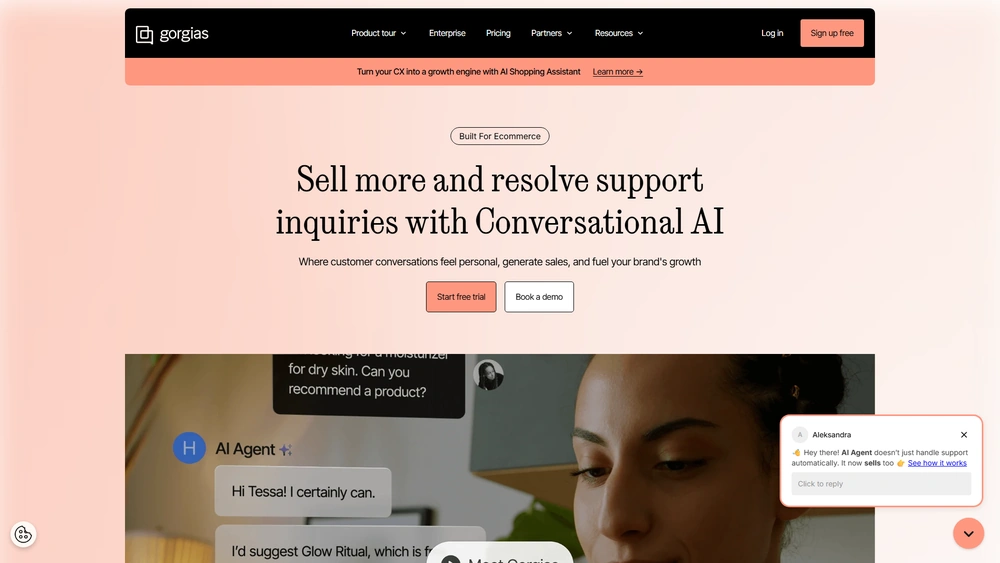Gorgias Overview & 2026 Industry Position
Gorgias is a leading helpdesk platform purpose-built for eCommerce brands, with deep specialization in Shopify integration and automation. In 2026, it’s positioning itself as the go-to customer experience (CX) ops suite for scaling sellers—powering everything from support ticket resolution to revenue-driving conversations. With AI-infused workflows, robust integrations, and revenue attribution for support, Gorgias has evolved far beyond a basic helpdesk into a full-fledged conversational commerce hub.
From Launch to 2026: Gorgias’s Journey
Gorgias launched in 2015 as a Chrome extension for templated Gmail responses. By 2017, it pivoted into an AI helpdesk platform tailored to Shopify merchants. Rapid growth followed, fueled by YC backing and a laser focus on support for eCommerce.
- 2015: Chrome extension MVP launched
- 2017: Pivoted to Shopify helpdesk and secured seed funding
- 2019: Raised Series A; added integrations with Magento, BigCommerce
- 2020: Introduced revenue attribution for support
- 2023: Released automated intents & workflows
- 2024: Surpassed 12,000 customers; launched AI Voice integrations
In 2026, Gorgias is focused on scaling the intelligent CX layer for commerce—blending human support teams with generative AI and automation to turn service into sales.

Gorgias Key Features
Built from the ground up for online merchants, Gorgias delivers AI-enhanced, conversation-first support tools aligned with sales goals. Key features include:
- Multi-channel Inbox: Unified support inbox for email, chat, social, SMS, and voice
- Revenue Attribution: Track revenue influenced by support interactions
- Macros + Rules: Prebuilt responses and automated workflows for efficiency
- AI Agent Assist: GPT-powered suggestions and task automation
- Live Chat & Voice: Integrated real-time support with context-aware scripts
- Self-service Portals: Customizable help centers and FAQ automation
Workflow & UX
The Gorgias user experience strikes a balance between powerful automation and intuitive usability. The main dashboard consolidates all tickets, sentiment signals, and revenue impact into one view. Macros suggest replies based on context, and agents can customize them on the fly. Custom roles, keyboard shortcuts, and intelligent ticket prioritization make the platform fast for high-volume teams.
Top UX highlights:
- Searchable, filterable inbox by channel, tag, or revenue
- Left-rail CRM-style view showing each customer’s order history and Shopify data
- Rule builder UI with simple logic blocks for automation
- Fast-loading interface on both desktop and mobile views
Gorgias Pricing Analysis & Value Metrics
| Plan | Monthly Price | Tickets Included | AI Automations | Revenue Tracking |
|---|---|---|---|---|
| Starter | $10 | 50 | ✓ | ✓ |
| Basic | $60 | 300 | ✓ | ✓ |
| Pro | $360 | 2,000 | ✓+ | ✓ |
| Advanced | Custom | Unlimited | ✓✓ | ✓ |
Every plan includes revenue reporting and AI capabilities, even at the Starter tier. It’s a rare entry-point for eCom brands needing smart CX early in their maturity.
Competitive Landscape
| Tool | Best For | Key Differences |
|---|---|---|
| Gorgias | eComm SMBs | Revenue attribution, eCommerce automation |
| Zendesk | Enterprise CX | Broader stack, heavier UI |
| Freshdesk | SMBs (B2B) | Lower cost, less eComm focus |
| Re:amaze | Boutique brands | Integrated marketing, lightweight inbox |
Use Cases
- Shopify stores experiencing support volume spikes
- DTC brands expanding to omnichannel fulfillment
- Merchants outsourcing Tier 1 support
- Affiliate/reseller programs needing custom flows
- Subscription-based beauty or wellness eCom
Gorgias Integrations
With native integrations across Shopify, Magento, BigCommerce, and WooCommerce, Gorgias connects directly to cart and product systems to pull customer order details. Additional integrations include:
- CRM: HubSpot, Zoho
- Messenger + Chat: Facebook, Instagram, WhatsApp, SMS, ChatGPT
- Shipping: ShipBob, AfterShip, EasyPost
- Email marketing: Klaviyo, Mailchimp
- AI + Tasking: Zapier, Aircall
Pros & Cons
- Pros:
- Purpose-built for eCommerce workflows
- Revenue visibility for each ticket
- Starter plan allows cost-effective AI support
- Simplified automations with macros and rules
- Cons:
- Can get expensive with high ticket volume
- Not suited for B2B/enterprise CRM use cases
- Integrations outside of commerce need expansion
Pro Tip: Use Gorgias automations to auto-close repetitive tickets like “Where is my order?” with order tracking logic from Shopify or ShipBob.
Final Thoughts
If you’re a commerce brand aiming to scale support without bloating headcount, especially on Shopify, Gorgias is a standout choice in 2026. It empowers smaller teams with smart, revenue-linked CX tools that pay for themselves over time. That said, large enterprises with multiple product lines or non-eCommerce teams may outgrow its domain-specific features. Overall, it excels as a specialist helpdesk within a rich commerce ecosystem.
Gorgias FAQ
Yes, Gorgias connects natively to Shopify, syncing order data, customer info, and tracking links into the support dashboard in real time.
Yes, Gorgias includes native live chat functionality with ChatGPT-powered suggestions, making it a viable all-in-one support solution.
Pricing tiers are primarily based on monthly ticket volume, with automation and AI included at all levels. High-volume plans go custom with dedicated success teams.
While possible, Gorgias is optimized for eCommerce brands and lacks some deep B2B CRM features common in tools like Salesforce or Zendesk.
Yes, through integrations with platforms like AfterShip or ShipBob, agents can automate replies to returns and tracking issues using templated macros.

